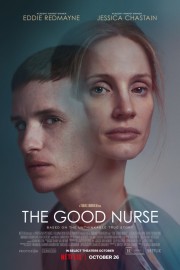The Good Nurse
I don’t know that we’ll ever truly understand the reasons people have a desire to kill another person. We can certainly prescribe any number of psychological reasons for it, and there may even be some personal reasons, but ultimately, the taking of a life feels like something that is one of those mysteries. In “The Good Nurse,” Charlie Cullen never gives us an indication of what his reasons were for doing what he did, and any attempts to get that answer out of him are futile. That ambiguity is frustrating, and it makes the film more interesting than it otherwise would have been.
The film begins in 1996, at a hospital in Ohio. Cullen (Eddie Redmayne) is the first one to notice that a patient is going into cardiac arrest. He calls for additional help, but the patient is unable to be saved. Several years later, we meet Amy Loughren (Jessica Chastain), a nurse and mother of two working in a New Jersey hospital. She works the night shift, and it’s having an adverse impact on her heart. Unfortunately, her health insurance doesn’t kick in until she’s been at her current job for a year, and she has four months left. It’s at this moment when Cullen is hired by the hospital, and he starts to work night shifts, as well. One night, one of Amy’s patients dies unexpectedly. An internal investigation leads to a police investigation, but the detectives on the case (Noah Emmerich and Malik Yoba) do not find the hospital helpful. All the while, Amy and Charlie get closer, and more people die. Something strange is going on.
Setting aside the true crime aspect with Charlie, the film by Tobias Lindholm- adapted from Charles Graeber’s book by Krysty Wilson-Cairns- is an indictment on the American health care system, not just in how the hospital- represented by Kim Dickens’s character- seems to be covering up Charlie’s actions (no doubt to escape criminal proceedings against them), but the fact that Amy feels as though she needs to cover up her own health issues, and keep grinding at a job that is having an adverse effect on her health, all because her health care doesn’t start until she’s been at the job for a year. That is a gross way to make people live, increasing their anxiety about being able to afford health care because they have to hit certain benchmarks in their livelihood, all the while being anxious about what their job is doing to their health. Charlie wants to help Amy, though, and admittedly, that feels like one of those movie conceits that is required to cause a dilemma in Amy when she starts to understand what Charlie is doing, and one of the things that is smart about the film is how it doesn’t take that into the direction you think it will go as Amy begins to investigate Charlie with the police- yes, she could still lose her job, but her morality is more important. That tension is one of the strongest aspects of the film.
Overall, “The Good Nurse” is a solid true crime potboiler, directed in a very dry way, but elevated by the performances by Redmayne and Chastain. It doesn’t have much to offer beyond that, and that is fine- it offers up the story is a stoic, but not exploitative, fashion, which- given that these are real people- is all the better. Beyond that, I’m not sure you’ll remember it too long after watching it.










